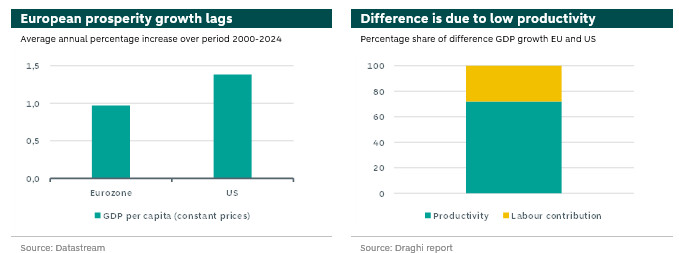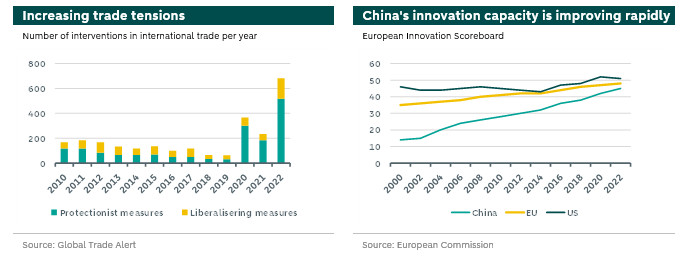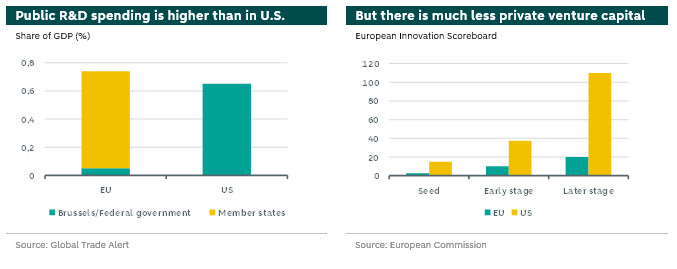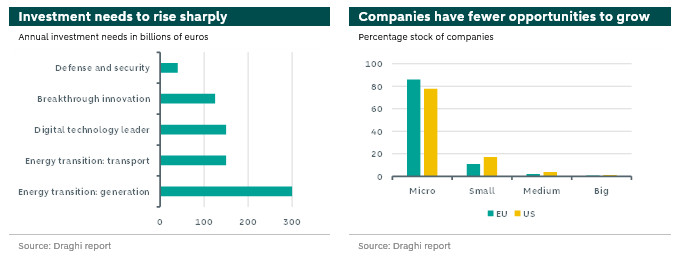Macro Watch - Clear mission for new European Commission

Priority of new European Commission will be improving competitiveness. The guiding principles here come from Mario Draghi's recently published report. European member states must invest more in innovation, coordinate their policies and integrate knowledge, competition, trade, industrial and security policies.
Improving competitiveness a priority of the European Commission
The European Commission, newly formed by Ursula Von der Leyen, has as its key priority the improvement of European competitiveness. The guiding principles here is Mario Draghi's recently published report. That provides an analysis of the causes of lagging competitiveness, its adverse effects and the measures needed to reverse the downward trend. At stake, according to Draghi, are nothing less than fundamental European values. Prosperity, equality, freedom, and democracy in a clean, sustainable environment are no longer guaranteed if the European economy falls further behind, according to the former ECB president. His report follows a series of previous analyses on the same subject. The report stands out because it is more comprehensive, far-reaching, and detailed. Policymakers will therefore not be able to avoid Draghi’s prescriptions in the coming years. But what does the report say and where are the biggest challenges with respect to the measures it proposes?
Europe's fundamental values at stake
Draghi begins his report on European competitiveness with a problem outline. The geopolitical environment is less friendly than before, and trade tensions are mounting. Partly because Europe depends on other countries for its raw materials, energy costs are structurally higher than in the U.S. and China. In recent decades, the economy was still growing thanks to increasing demand in Asia and increasing female labor force participation. But today, European companies are facing competition from Asia and the pool of additional workers is drying up. With the population continuing to age, there is a threat of a shrinking rather than a growing labor force. Europe's only way out to grow economically is to increase productivity. Compared to the U.S., however, productivity growth has been low for years. This is because Europe specializes in sectors that are less innovative and invests little in knowledge and technology development. In addition, productivity growth is hampered by inadequate worker skills, complex regulations, and slow decision-making.
What are the underlying problems?
Innovation capacity lags behind
Europe lags in terms of innovation capacity, according to the report. For a long time, Europe had a comparative advantage in green technology, but it is increasingly challenged in that area as well. Innovation does occur in Europe, but in sectors with a low R&D component, such as the automotive industry. Europe hardly counts when it comes to digital innovations in the ICT sector, where R&D spending is high, and the innovations often have broader applications and are therefore more valuable. In Europe, private sector R&D spending is on average lower than in the US, while public spending is slightly higher. Unfortunately, there is little pooling of these public resources, leading to overlap in spending and untapped opportunities to achieve economies of scale. Because of the lack of coordination among member states, public funds end up yielding less than would be possible if member states would coordinate their policies.
Skill gaps for workers
European companies also must work hard to find workers with the right skills. The demands on workers have changed due to technological shifts. Digital skills have become more important, a shift that will continue in the future. The demand for “green” skills will also increase as the sustainability of the economy takes more shape. This “twin transition” means that the need for science, technology, engineering, and mathematics are (STEM)-graduates will continue to grow. But STEM subjects are not that popular among European students. Other challenges for Europe are to support the aging workforce in keeping their skills up-to-date and to give young people from lower socio-economic backgrounds the opportunity to develop their talents. The latter currently happens too little. Europe does not allocate enough money to education and there are significant differences in education budgets between member states.

Europe is under-investing
Furthermore, there is little investment in Europe, despite the elevated level of savings. A sizable portion of European savings flows to investment opportunities elsewhere. Moreover, the European financial system is not good at directing capital to risky investments. The European capital market is too fragmented and shallow, as compared to its U.S. counterpart, the volume of trade is limited. In the absence of a well-developed, integrated capital market, European companies rely for funding on banks, which, because of their public utility function and the way they raise funding, are less equipped to provide risky capital. This is even more true in Europe than in the U.S. because European rules on loan securitization by banks are stricter than U.S. rules.
Competition policy hinders economies of scale
European companies also suffer from merger and acquisition regulations. Draghi endorses the importance of free and fair competition. That is a necessary condition to protect consumers and companies from abuses of economic power, to keep prices low and to spur innovation. At the same time, he believes that innovation is hampered if European companies are not given the opportunity to achieve the scale needed to justify investment in innovation. As a result, they are no match for American and Chinese competitors, that do have that opportunity. Indeed, for strategic purposes, competition, international trade, and industrial policies are more integrated there. Draghi sees examples of this especially in highly innovative sectors, such as ICT, where companies differentiate themselves from competitors through scale and innovation rather than low prices.
Sticky decision-making and complex regulation
Finally, European competitiveness is hampered by slow decision-making and complex regulation. Politically, Europe is still a patchwork quilt. Individual member states can veto decisions, giving them disproportionate influence over decision-making. As a result, political decisions come about with difficulty. On top of this, member states have room to negotiate exceptions and impose additional requirements over and above the rules set from Brussels. As a result, the common market exists at best on paper. Differences in regulations and taxes increase the cost for companies to enter new markets. In the absence of opportunities for growth, potential economies of scale and specialization remain underexploited, and companies struggle to attract venture capital. Moreover, member states are not well placed to promote their collective interests and pull their collective weight on international occasions, for example, in the procurement of raw materials. In this sense, Europe is punching below its weight.

What measures are needed to turn the tide?
Improving innovation capacity
Draghi is producing all sorts of adjustments to restore European competitiveness. If more European universities compete at the top rather than the middle of the pack, innovation capacity will improve. The door for foreign talent should be opened and researchers should be given more opportunities to commercialize their innovations, for example through improved access to venture capital. A first step toward this is the establishment of an agency inspired by the U.S. ARPA, which will encourage and set targets for disruptive research. Furthermore, incentives for commercialization of innovation will increase if the royalty and patent system is overhauled and entrepreneurship becomes more financially attractive.
Train workers with the right skills
According to Draghi, the employability of workers can be improved if data is collected on skills. This kind of data, which will come when employers, unions and educational institutions work together more intensively, will help tailor educational programs to the labor market. In addition, adult education needs to be expanded so that workers can receive timely retraining and further education and continue to participate. Moreover, if member states succeed in harmonizing their curricula and diplomas, this will contribute to labor mobility within Europe.
More investment, both private…
Europe will additionally need to invest much more. Draghi is thinking of EUR 800 bn annually over the period 2025-2030. Overall, investment needs to increase by about five percentage points, from 22 to 27 percent of GDP. This higher level of investment is needed to accelerate the energy transition so that Europe becomes less dependent and vulnerable for its energy supply, to become a leader in digital and breakthrough technologies, and to invest in defense and security so that Europe becomes less vulnerable. To bring together the resources needed to do this, the capital market union should be expanded. Important steps in this regard are the merging of supervision, the broadening of opportunities for venture capital and securitization by banks, and the development of fully funded pension plans.
...and public
Crucial to the development of capital market union is the creation of a European debt asset, which helps price corporate bonds uniformly, serves as safe collateral in transactions and contributes to liquidity, making the euro a more attractive reserve currency. That safe liquid European debt asset can come about if European member states issue debt jointly, as with the recovery fund. The funds thus made available could then be used by the EU for innovation. Indeed, it is too optimistic to assume that all the funds required will be provided by the private sector. If Europe succeeds in boosting productivity, the cost of the jointly issued debt can be covered by the economic benefit generated by the collective investment.
Integrate and coordinate policies
Draghi further suggests changing competition policy. When assessing mergers and acquisitions, competition authorities should consider not only the price impact on consumers but also the future impact on innovation. In addition, in view of tense geopolitical relations and international vulnerability for critical raw materials and semi-finished goods, they should include defense security and supply safety in their analysis. This also applies to the provision of government subsidies. In short, Draghi is linking competition, industrial, trade, security and innovation policies ex ante and adding ex post controls to prevent abuses. This is a major turnaround from current policy.
Simplify decision-making and reduce regulatory burden
Decision-making in Europe can be simplified by moving decisions in the EU Council from unanimity to qualified majorities. This prevents votes from being hijacked by a veto. In addition, decisions should be taken at the right level. According to Draghi, the subsidiarity principle should be leading - only central if it cannot be decentralized. The center, i.e. Brussels, should be reluctant to impose rules. At the same time, member states should be reluctant to adapt and supplement centrally determined rules locally, because only then can fragmentation of the common market and the ever-increasing regulatory burden be broken.

Comments on Draghi's proposals for action
Difference in priorities
Draghi's report has been criticized. While the energy transition is given top priority, there are comments from green stakeholders that the role of ecosystems is underrepresented. What also does not go down well is that it is unclear which stakeholders were at the table when the report was drafted. Draghi's idea that member states can get better value for money if they coordinate their defense purchases and integrate the defense industry is again opposed by nationalist circles, who do not like European cooperation anyway and abhor the idea of more qualified majority voting.
Political difficulties
In addition, there are other political difficulties. Due to the substantial differences among member states the task of expanding fully funded pension plans can be light, but also very heavy. The Netherlands, for example, is well placed. But France will not be a big supporter of this idea. In addition, the question is whether joint debt issuance is a sufficient condition to create a liquid European safe asset. The low-risk premium to match will only come about if Brussels is also allowed to levy taxes as the higher liquidity premium on financial markets indicates that Eurobonds are treated as SSA (sovereign, supranational and agency) bonds rather than Sovereign Bonds. Joint debt issuance is difficult, joint taxation even more.
Economically the best choices?
Then there are economic doubts. Are not the proposals regarding digitization too much focused on hardware and infrastructure and too little on content? Don't adjustments to the royalty and patent system open the door to privatization of publicly funded research? And to what extent are the investments inflationary? If so, the additional investments could mean tighter monetary policy from the ECB, and fiscal and monetary policies would be working against each other unless spending cuts are made in other areas. The biggest point of discussion is whether consumer interests will not be undermined if competition policy considers other aspects than prices for consumers and if economies of scale become an end in themselves. Exactly what weight will these other aspects be given, and how can it be checked ex post whether monopoly (or oligopoly) powers have not been abused? Removing trade barriers between member states and harmonizing rules is probably a more effective way to stimulate innovation and economies of scale.

Yet support for coherent Draghi plan too
These criticisms aside, the proposals put forward by Draghi can also count on approval. It is good if Europe is more aware of the interdependencies between competition, industrial, trade and security policies and better coordinates strategic choices, for example by - as Draghi suggests - establishing partnerships with suppliers and joint purchasing of raw materials and other products crucial to the economy. Draghi's proposals are well thought out and practical. They are not entirely new, as most of the proposals have been made before. But the biggest gain is in Draghi's highlighting the necessary adjustments in conjunction with one other. This gives them more weight in the discussion about the future of Europe. An important discussion because the stakes are high. If European member states cooperate with each other and better align and coordinate their policies, they can achieve more with the same resources. This will help ensure Europe’s high standard of living.
